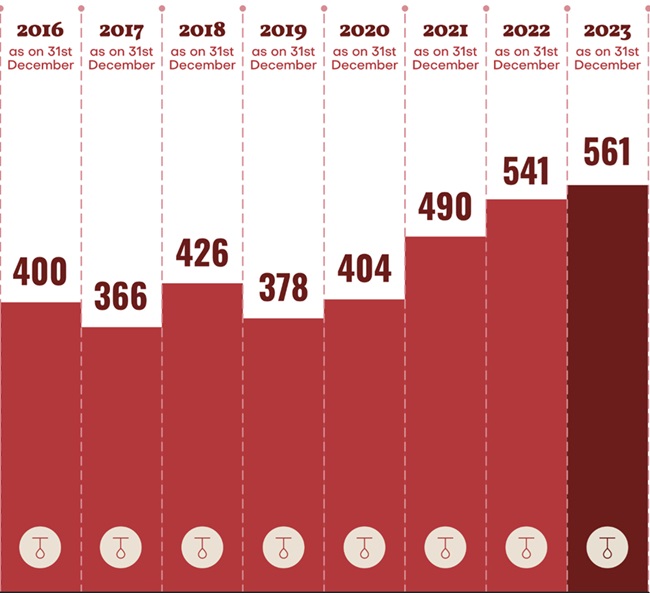What is Capital Punishment
- Capital Punishment is defined as a death penalty ordered by the state owing to the commission of a Crime.
- Crimes that can result in the death penalty are known as capital crimes or capital offences.
Object of Capital Punishment:
- The prime reason behind capital punishment is its efficacy in deterring identical or similar crimes.
Capital Punishment in India :-
- According to the ‘Death Penalty in India: Annual Statistics 2022’ report the Supreme Court awarded the death penalty to only seven people from 2007 to 2022.
- Trial courts awarded 165 death sentences in 2022, the highest in over two decades.
 Provisions For Capital Punishment in India :-
Provisions For Capital Punishment in India :-
- Statutory Provision: The Air Force Act, of 1950, The Army Act, of 1950, and The Navy Act, 1957 provide punishment for offences, including hanging or death by shooting
Status of Capital Punishment Across World
- 36 countries worldwide practise it, and 103 countries have completely abolished it for all crimes.
Supreme Court Judgement on Capital Punishment in India
Jagmohan Singh v. State of Uttar Pradesh (1972):
- The constitutional validity of the death penalty was upheld by the SC.
Rajender Prasad v. State of Uttar Pradesh:
- The court held that the death penalty directly affects the life of the people guaranteed under Article 21 of the Constitution. To impose death penalty, the two things are required:
- The special reasons should be recorded for imposing the death penalty in a case.
- The death penalty must be imposed only in extraordinary circumstances.
Bachan Singh vs State of Punjab (1980):
- In this case, the SC upheld the death penalty, but limited it to the ‘rarest of rare cases’.
Deena Dayal vs Union of India And Others (1983):
- It upheld the capital punishment by ruling that hanging is “as painless as possible” and “causes no greater pain than any other known method”
Arguments in Favour of Capital Punishment
Retribution:
- Real justice requires people to suffer for their wrongdoing, and to suffer in a way appropriate for the crime.
Utilitarianism:
- Utilitarian theory propounded by Jeremy Bentham aims at welfare-maximising actions and conveys that the consequential welfare of the society outweighs the deprivation of life of the criminal.
Deterrence:
- It has been argued that it gives victims’ families satisfaction and serves as a deterrence to potential offenders, preventing them from committing these extremely horrible crimes again.
Public Safety:
- The public has to be safeguarded against the possibility of release of a murderer which may cause further crimes.
Arguments Against Capital Punishment :-
Violation of Right to Life:
- The death penalty also violates the fundamental right to life guaranteed by the Indian Constitution.
- The Indian Constitution, under Article 21, states that no person shall be deprived of his “Right to Life” unless done with due process.
Methods of Penalty:
- According to the Indian Constitution, state-sanctioned executions have to be as comfortable and painless as possible but there is no easy method available for this.
Poor Deterrence Effect:
- There is no proof that the death penalty serves as any kind of deterrence.
Discriminatory:
- The death penalty is discriminatory. It is often used against the most vulnerable in society, including the poor, ethnic and religious minorities, and people with mental disabilities.
- Around 76% of convicts of Death Penalty belonged to lower and backward castes contravening the philosophy of ethics and morality.
- Additionally 93.5% sentenced to death penalty for crimes of terror belong to Scheduled Castes or religious minorities.
Scope for Reform:
- Life imprisonment offers a chance for rehabilitation, whereas the death penalty limits any opportunity for redemption.

 Provisions For Capital Punishment in India :-
Provisions For Capital Punishment in India :- 
